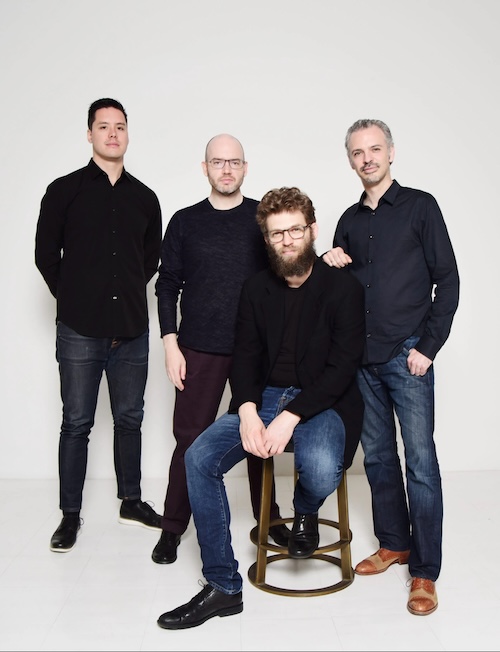Brooklyn Rider triumphs in a program of Schoenberg and surprises

Brooklyn Rider performed Saturday night, presented by Washington Performing Arts. Photo: Shervin Lainez
Concert and recital programs often are organized around a featured work, a well-known composition that performers and audiences tend to consider the main event. What happens before or after that anchor piece sometimes can seem beside the point.
In the case of Saturday evening’s concert of the string quartet Brooklyn Rider at the Sixth & I Historic Synagogue, presented by Washington Performing Arts, the anchor work was Schoenberg’s String Quartet No. 2 in F-Sharp minor, Op. 10. And while Brooklyn Rider, with soprano Ariadne Greif, dispatched Schoenberg’s quartet brilliantly, it was the compositions that preceded and followed Schoenberg on the program, many commissioned for group, that contributed just as much to mark the evening a triumph.
The quartet wasted no time in announcing its virtuosity, tossing off an opening glissando in the first piece: Clarice Assad’s Cinematheque. The Brazilian-American’s composer, pianist, vocalist and teacher describes her short composition as a “fictional film score,” and invites the listener to “create a title for this fictional film.” Indeed, the composition’s melodies, sometimes sweet and soft, other times fast and loud, could accommodate a variety of narratives.
Beyond Brooklyn Rider’s technical excellence, Assad’s chordal voicing displayed the group’s rich sonority, which, like its intensity and energy, was present all evening. While the composition builds on a sadly hopeful tune featuring first violinist Colin Jacobsen, he set the standard for the evening of not overplaying when soloing. Additionally, accompanying figures rarely intruded on solo melodies.
It was not a surprise that American composer, singer and songwriter Gabriel Kahane’s American Studies seemed suited to Brooklyn Rider’s many strengths. Based in Brooklyn, Kahane has known the group for a dozen years and dedicated the piece for the players (Jacobsen, violinist Johnny Gandelsman, violist Nicholas Cords and cellist Michael Nicolas).
The quintet is derived from a song Kahane wrote in October 2020, when he was determined to forego the internet for a year and write a song every day for a month as the chaotic reality of the Covid-19 pandemic was settling over the world. In the songs he wrote that month, Kahane said he gave himself “permission to write about small things, rather than trying to distill the enormity of the moment… .” Yet on October 9 of that year, he wrote a song, “To Be American,” that, he said, “insisted on a large canvas.”
While the song celebrates and interrogates nostalgia, the quartet is sunnier, at times recalling the fiddle themes of Aaron Copland’s Rodeo. Brooklyn Rider was at home in Kahane’s string-band figures and when he turned the initial theme on its head, slowed and reharmonized it. Along the way there were additional Copland-like touches, including brief moments of silence, the piece ending with a frenetic coda, perhaps signifying the manic yet exuberant spirit that eventually gripped parts of country.
It’s not difficult to imagine why fisticuffs nearly ensued during the 1908 Vienna premiere of Schoenberg’s Second Quartet. Even today its dissonances and extreme ranges made some of Brooklyn Rider’s program seem tame.
While Brooklyn Rider exploited the opening two movements of the work’s opposing rhythms and chromatic harmonies, the third and fourth movements offered the night’s few issues.
Schoenberg’s insertion of a female vocalist is a terrific contrast to the strings. Soprano Ariadne Greif displayed great range as she easily handled the extremities of the vocal part. However, there were moments when the quartet slightly overpowered their soloist. Moreover, the clarity of the vocalist’s diction was, at times, blurred by the dry acoustic.
Much more effective, on many levels, was the night’s final work, violinist Jacobsen’s Suite from Chalk and Soot, which he excerpted from music he composed for the dance company Dance Heginbotham.
Saying the suite, which includes poetry from the painter Wassily Kandinsky, is inventive, is an understatement. For example, its opening bars have Jacobsen and cellist Nicolas singing a fanfare of “La, la, la.”
A movement later, the rest of the players sing the words, “hah.” Eventually soprano Greif joins them. In the movement called “Exit,” Kandinsky’s text mentions clapping. Appropriately, quartet members and vocalist clap, first slowly and then faster.
While much of this could come off as gimmicky, Brooklyn Rider was as disciplined about its vocal interjections as its string playing. At times, Jacobsen put down his violin and sang difficult parts in a very workable falsetto.
Greif, too, left her comfort zone, ending the suite crooning a bluesy tune with Nicolas picking at his cello like a jazz bassist. One left the concert upbeat and wondering, with anticipation where Brooklyn Rider will go next.
Washington Performing Arts presents soprano Karen Slack in “African Queens” 7:30 p.m. March 9 at the Kennedy Center. washingtonperformingarts.org
